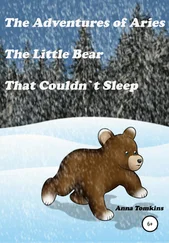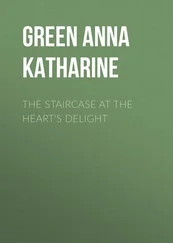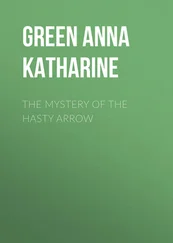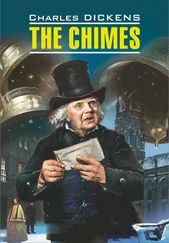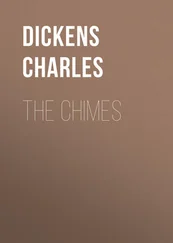Lucien comes to sit next to me, where I’m craning my head out of the porthole. He’s holding the paper map that Netty gave me.
‘Callum says we’re here.’ He points to a place near where Netty has marked with an X. ‘The village is called Reading.’
We stop just before a large lock. Rushing water speeds past in the dark, and the wind pushes between the broken buildings on either side of us.
We hood up. I sing Lucien the tune that Netty gave me and he sings it back.
The village is grey and ugly. We walk through a huge concrete tunnel lined in yellow-painted mettle. The tune takes us along a wide sunken road with half-broken walls high above it. It feels bare and exposed in the moonlight. After walking through the wide, quiet streets and rubble for ten minutes, the tune takes us down a narrow, straight street of houses. Those houses that are still standing are small and redbrick and all the same — jammed together with windows along the front like staring eyes.
There’s no glass left, of course, but about half have the windows boarded on the inside. Those are the lived-in ones, I guess.
Lucien counts off the beats from the corner and we reach the middle of the street before the tune runs out. The house looks the same as all the others. There’s a garden in front with overgrown hedges. Lucien pushes the gate open and it swings with a mettle note, C sharp. The grass out front is covered in moonlight. There’s an old concrete fountain sitting in the middle filled with burnt paper, flakes of ash sprinkled around it. At its base is an old leather shoe half eaten by foxes.
The moon makes strange shadows with the shapes of the scrunched-up paper in the dish of the fountain. We both look at the door. All is silent. Lucien turns to me.
‘I’ll wait for you here in the garden.’
‘You’re not coming?’ For the first time I notice the cold slip around my shoulders and ribs like a wet garment.
‘No.’
‘Why not?’
‘Look at my eyes. She’ll see I’m from the Order. It’s best if you go alone.’
‘What am I meant to do?’ I don’t like the weak sound of my voice. I have been going along this road because it’s Lucien’s road. I know I have anger kindled down below, for what happened to my parents, for the things we have all lost, but it is out of reach. I feel like I’m listening to a song around me and I have no idea what part to take.
Lucien looks at me and his eyes are lunar also, casting out into the night. His hair is silver. I straighten my back. I am ashamed of my uncertainty.
‘None of us knows what we are meant for,’ he says. ‘Even if a person keeps their memories intact, don’t suppose the way forward is always clear. But we know a thing that needs to happen. So we must get help.’
Behind my eyes, I see black shapes, as if against a white sky, coming together in patterns like water does. Turning, wheeling, dispersing…
If only, I think, the way forward and the given meaning were lit clear. If I had a name or a meaning that was one single note.
‘Take this,’ says Lucien, and reaches inside his T-shirt. He takes his mother’s ring from the pouch, flicks the catch and removes the guildmedal. Then he puts the medal back into the leather pocket and puts its cord over my head. I feel the Lady’s mild pulse.
He walks away until he’s standing under a half-dead oak tree in the corner of the garden. For a beat it looks as if the branches are growing from his head, crowning him. Then I turn, crunch up the gravel path, take a breath, knock.
Silence. I put my ear to the door. It was once green, but now its paint is curled and peeling off in flakes.
Far off inside the house, there’s a bang like something falling off a shelf. I wait and there is silence again. I might have imagined it.
Behind me in the garden, I can feel Lucien watching, blind as the moonlight makes him, but still watching. I reach out, grasp the door handle and turn.
The door opens partway and my eyes adjust slowly. My heart is beating tight with fear. The hallway is dark, but there’s a window at the end that gives onto a back garden and lets in a thin corridor of moonlight.
Once in, I see why the door did not open fully. The corridor is packed. Above me, the walls are lined with boxes of every colour and size. Stacked to twice my height on haphazard shelves made from thin wood and bricks, from rope and cardboard, from para cartons, from instrument cases. Crammed into the shelves, like a crazy person’s market stall, are strange objects.
Silver forks and knives sit next to strings of bright coloured para beads. Piles of sheet music leaf out of rough piles onto children’s toys. There is old electrickery, paraboards with keys of code printed on them, antique clothing. There are ancient shoes, board games. I see a boat anchor, a dead pot plant, small mettle men holding weapons and crouched in still poses, mould-covered pillows, dolls with staring eyes. And hundreds of instruments, from the cheapest to the most valuable. One side of the hall is straddled by an old upright klavier, half of its keys gone like gappy front teeth and the top lifted off like an emptied skull so that more objects can nestle into the strings. There are clarionets, viols, tambors and, down in the corner glowing softly, a transverse flute made out of pure palladium.
I feel dizzy, like my knees are going to bend. Before they do, I sit down, close my eyes for a beat. I think of the stripped-clean spaces of our storehouse, my quarters with hammock stowed. My memory bag and candles the only objects on otherwise bare shelves. And then there is a shift in light. I jump up. Standing in front of the window to the back garden is an old woman.
I had thought that Netty was old, but I had never seen age. Not like this. The woman’s face is all wrinkles, like all the years and all the living of several people have been pressed into one body, one face. Her hair is as white and straight as the horsehair that viol makers buy from the tanners. She wears a cloak. I do not have time to be afraid.
I open my mouth, but before any words can come, the air around me is split by a scream. A shriek that has at its core the caw-caw of some strange animal — harsh and wild and black and frenzied. The sound is coming from her open mouth and it is rushing toward me so that I hold my hands up over my ears and face, and as her cry comes shrill and swift, she comes with it down the hall faster than is possible, with her cloak sweeping and flapping behind her like wings.
Before I can move, she is on me. Her two hands bent like claws round my throat. Nails in my skin and I cannot breathe. I am choking, drowning. In my nose is the smell of unwashed hair and rosin, as if her hair has been used to bow a viol’s strings after all.
Then suddenly I am released.
In the clawed hands, she has the leather pouch. She is hunched over it and I see a flash and feel the Lady’s small vital pulse of silence. She has removed the guildmedal. The next thing I see is the old woman’s head go back and her eyes twitch and roll. Her head goes back and something goes out of her. Or perhaps something goes into her. I cannot tell which.
I back away towards the far window. The glass cold on my back, some distance between us. The woman stands, still as still, the pouch in her clawed hands, the cloak settled over her.
After what feels like a long while, she emerges, blinking. Down her face, bright in the moonlight, are the wet tracks where tears have run, their simple lines gone crazed across the tricky wrinkles of her skin. Her head cocks to one side, and her eyes look out at me beady and wet and twinkled. Her face cracks and is remade into a smile. She opens her mouth and I tense for another screech, but what comes out, cracked and broken, is a tune.
Читать дальше
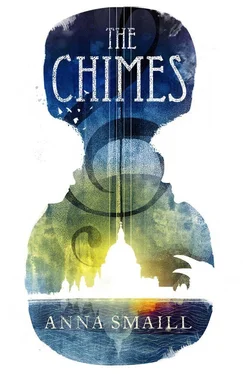

![Чарльз Диккенс - Колокола [The Chimes]](/books/395589/charlz-dikkens-kolokola-the-chimes-thumb.webp)


